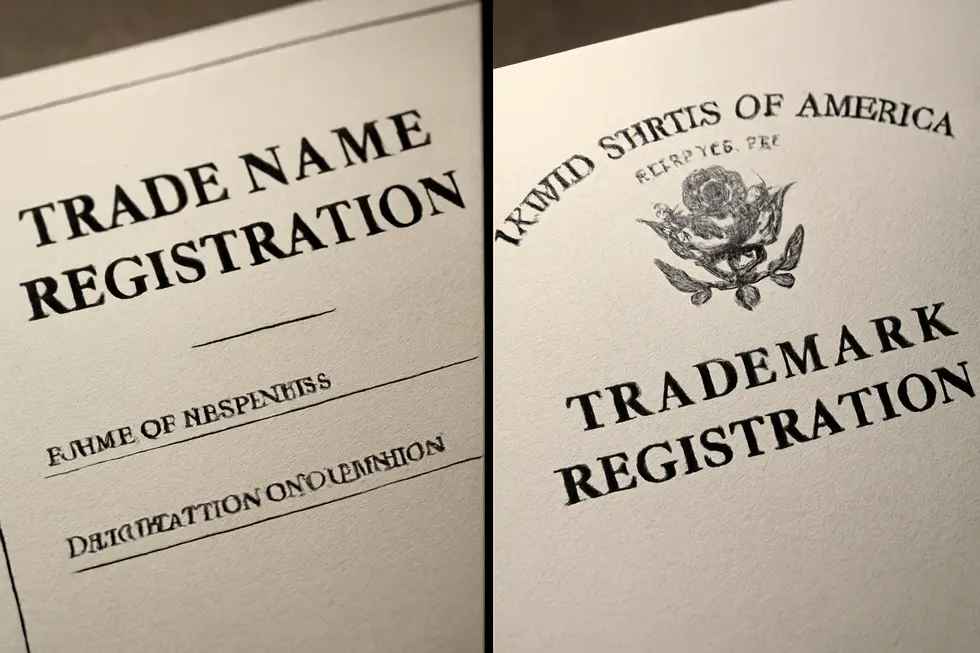Introduction
Choosing a business name is a foundational step for any entrepreneur. However, selecting a trade name that differs from the official legal business name brings important legal considerations. One key question arises: does a trade name need to be registered? Understanding when registration is mandatory, the procedures involved, and how it differs from trademark protection is critical to protect your business interests and ensure compliance. This guide breaks down the legal requirements and registration processes to help you make informed decisions. It also explores the economic impact of registering a trade name, from fees to benefits, and the societal role that registration plays in protecting consumers and maintaining market transparency. Each chapter offers clarity on these essential aspects, building a comprehensive understanding so you can confidently manage your business identity.
Tables of Contents
Chapter 1: Understanding Whether a Trade Name Needs to Be Registered: Legal Requirements and Procedures
- Legal Basics of Trade Name Registration: Key Definitions and Core Obligations
- Navigating State and Local Registration Procedures for Trade Names and DBAs
- Clarifying Trade Name Registration Versus Trademark Protection: Essential Differences for Business Identity
- Economic and Legal Impact of Registering a Trade Name Beyond Compliance
- Navigating Trade Name Registration: Jurisdictional Rules and Compliance Essentials
Chapter 2: The Process of Registering a Trade Name: What You Must Know About Does a Trade Name Need to Be Registered
- Why Registering a Trade Name Is Essential for Local Business Compliance and Identity
- Navigating the Essential Steps to Register Your Trade Name Legally and Effectively
- Key Differences Between Trade Name Registration and Trademark Protection in Business Naming
- Legal and Economic Impacts of Trade Name Registration: Balancing Compliance with Brand Protection
- Balancing Local Compliance and Nationwide Protection: Navigating Trade Name Registration Strategies
Chapter 3: Distinguishing Trade Name Registration From Trademark Protection: Does a Trade Name Need to Be Registered Versus Trademarked?
- Clarifying the Roles of Trade Name Registration and Trademark Protection in Business Identity
- Navigating the Legal Boundaries and Protections of Trade Name Registration Versus Trademark Rights
- Why Trademark Registration Matters Beyond Trade Name Registration for Nationwide Brand Protection
- Key Differences Between Trade Name Registration and Trademark Protection: What Each Means for Your Business Identity
- Weighing Legal Identity Against Brand Exclusivity: Strategic Choices in Trade Name Registration and Trademarking
Chapter 4: Economic Implications of Registering a Trade Name: Costs and Benefits When Considering Does a Trade Name Need to Be Registered
- Balancing Fees and Financial Commitments: A Cost Analysis for Registering a Trade Name
- Unlocking Economic Value Through Trade Name Registration: Strengthening Brand Identity and Market Opportunities
- Navigating Legal and Financial Impacts of Trade Name Registration for Sole Proprietors
- Maximizing Business Value: The Strategic Role of Intellectual Property in Trade Name Registration
- Weighing the Economic Impact of Trade Name Registration: Navigating Costs, Legal Protection, and Brand Value
Chapter 5: The Societal and Consumer Protections Linked to Trade Name Registration: Why Does a Trade Name Need to Be Registered?
- How Trade Name Registration Strengthens Legal Rights and Safeguards Consumer Trust
- Ensuring Consumer Confidence and Legal Clarity Through Trade Name Registration
- Fueling Business Growth and Consumer Confidence Through Trade Name Registration
- How Trade Name Registration Strengthens Brand Identity and Safeguards Market Trust
- The Critical Distinctions Between Registered and Unregistered Trade Names for Consumer and Societal Safeguards
Chapter 1: Understanding Whether a Trade Name Needs to Be Registered: Legal Requirements and Procedures

1. Legal Basics of Trade Name Registration: Key Definitions and Core Obligations
A trade name, often called a DBA (doing business as), represents a business name different from its official legal name. When a company operates under this alternate name, most states require registration to ensure legal acknowledgment and transparency. This process does not grant exclusive rights nationwide but serves to identify the business to the public and avoid confusion. It is important to distinguish a trade name from a trademark: the former is primarily for legal use and compliance, while a trademark protects brand identity and offers nationwide exclusivity. Registering a trade name involves filing with state or local agencies and does not replace the more complex process of securing a trademark, which requires registration through the USPTO. For further clarity on trademark protections linked to business names, see this resource on trademark protection for business names and logos.
For precise state or local requirements regarding trade name registration, consult official government sources such as this detailed guide: More on trade name registration and legal distinctions.
2. Navigating State and Local Registration Procedures for Trade Names and DBAs
A trade name, often called a DBA (doing business as), requires registration when it differs from the legal business name. While exact rules vary by state and locality, most jurisdictions mandate filing an Assumed Name Certificate with county or state offices to legally use a trade name. This process typically involves a simple application and a modest fee, generally under $20. Registration creates a public record ensuring transparency but does not grant exclusive rights nationwide. Business owners should verify that their trade name is unique within their jurisdiction to avoid conflicts, although exclusivity is only secured through federal trademark registration. Understanding local procedures and compliance requirements is essential for operating lawfully under a trade name. For further details, see this comprehensive guide on co trade name registration.
3. Clarifying Trade Name Registration Versus Trademark Protection: Essential Differences for Business Identity
When a business operates under a name other than its legal registered name, registering a trade name, commonly known as a DBA, is generally required at the state or local level. This registration permits the legal use of the trade name but does not guarantee exclusive rights or prevent others from using the same or similar names. In contrast, trademark registration is a federal process through the USPTO that grants exclusive rights to a name, logo, or slogan nationwide, offering stronger legal safeguards against infringement. While trade name registration is simpler, quicker, and less costly, it primarily serves to provide public notice and comply with local laws. Trademark protection, however, demands a more complex application process, higher fees, and provides broad exclusivity tied to specific goods or services. Understanding this distinction is critical because many entrepreneurs mistakenly believe that securing a DBA alone fully protects their brand identity. For comprehensive brand protection beyond local boundaries, pursuing trademark registration is essential. More insights about trademark protection can be found at the resource on trademark protection for business names and logos. For official details on trademark registration, visit the USPTO’s website.
4. Economic and Legal Impact of Registering a Trade Name Beyond Compliance
Registering a trade name is often legally required when operating under a different name than the entity’s legal one, serving as a vital step for public disclosure and regulatory compliance. However, this local registration does not grant exclusive rights or comprehensive brand protection. True exclusivity and stronger legal safeguards come from registering a trademark with the USPTO, which protects the name nationwide in connection with specific goods or services. While trade name registration involves relatively low fees and quick processing, trademark registration requires more time and investment but significantly enhances a business’s intangible assets and enforcement capabilities. Without registration, trade names are vulnerable to duplication and offer limited recourse against competitors. Combining proper trade name registration with federal trademark registration maximizes both legal protection and economic value, securing your brand identity and bolstering its market worth. For deeper insight into trademark protections that complement trade name registration, consider resources on trademark protection for business names and logos.
5. Navigating Trade Name Registration: Jurisdictional Rules and Compliance Essentials
Trade name registration requirements vary widely by jurisdiction, hinging largely on whether a business operates under a name distinct from its legal entity. Many states and local governments mandate submitting a DBA (doing business as) filing when a different trade name is used, ensuring public transparency and consumer protection. Sole proprietors using a trade name differing from their personal name must also register it locally, although such registration does not confer exclusive rights to the name. Unlike trademark registration—which grants federal protection and exclusivity through the USPTO—trade name registration primarily serves as a public disclosure of ownership. Fees and procedures differ regionally, so businesses should verify local mandates carefully. For comprehensive brand protection, applying for a trademark is essential, involving specific legal steps beyond trade name filing. For further insight into protecting your business identity, see trademark protection business name and logo.
Chapter 2: The Process of Registering a Trade Name: What You Must Know About Does a Trade Name Need to Be Registered

1. Why Registering a Trade Name Is Essential for Local Business Compliance and Identity
Registering a trade name is crucial when a business operates under a name different from its official legal designation. Most states and local governments require this registration to ensure transparency and protect consumers. This process, often involving filing a Doing Business As (DBA) form and paying a fee, creates a public record that ties your business identity to that name within the jurisdiction. While registration limits others from using identical or confusingly similar names locally, it does not grant the exclusive nationwide rights that a trademark provides. Trademark registration, handled by the USPTO, is a separate, more complex procedure offering broader brand protection. Understanding these distinctions helps businesses maintain compliance and secure their identity effectively. For more on securing your brand beyond trade name registration, visit trademark protection for business names and logos.
2. Navigating the Essential Steps to Register Your Trade Name Legally and Effectively
Registering a trade name, often called a DBA (Doing Business As), is a vital step when operating under a name different from your legal business name. The process begins with verifying that the chosen name is not already in use through a search in state or local databases to avoid conflicts. Once confirmed, you submit a registration application to your jurisdiction’s appropriate office, such as the Secretary of State or county clerk’s office, including the desired trade name, your official business name, and address, alongside a filing fee. Some areas may also require public notification through a newspaper notice. Upon successful registration, you receive official documentation to validate your business identity. Keep in mind that trade name registration usually requires periodic renewal to maintain compliance. While essential for local legal recognition, a trade name registration differs from a trademark. For comprehensive brand protection, consider trademark registration, which grants exclusive nationwide rights. For further guidance on trademark protection, you can explore resources on trademark and business name protection.
3. Key Differences Between Trade Name Registration and Trademark Protection in Business Naming
A trade name, often known as a “doing business as” (DBA) name, identifies the business entity operating publicly under a name different from its legal designation. Registering this trade name is usually required at the state or local level to comply with licensing regulations and maintain transparency. However, this registration simply grants permission to use the name within that jurisdiction and does not protect the brand’s identity or prevent others from using similar names. In contrast, a trademark offers legal protection for brand identifiers—such as names, logos, or slogans—on a federal level through USPTO registration. This process is more complex and costly but provides exclusive rights and stronger safeguards against infringement nationwide. Therefore, while trade name registration legitimizes local business operations, securing a trademark is essential for comprehensive brand protection and intellectual property rights. For businesses aiming to protect their brand fully, consulting resources on trademark protection for business names and logos is highly advisable.
4. Legal and Economic Impacts of Trade Name Registration: Balancing Compliance with Brand Protection
Registering a trade name, often filed as a “doing business as” (DBA) name, is typically required when a business uses a name different from its official registered entity. While this registration ensures legal compliance and enables operating under the chosen name, it does not grant exclusive rights or trademark protection. Without trademark registration, others may use identical or similar names, risking brand confusion and economic loss. Trademark registration, although more complex and costly, offers exclusive nationwide rights and stronger legal remedies. Economically, registering a trade name helps establish business identity and customer recognition but provides limited defense against infringement. For stronger protection and market advantage, businesses should pursue trademark registration alongside DBA filing. Understanding these nuances is essential for securing both compliance and meaningful brand security. For more insights, see trademark protection for business names and logos. External details on trademark protections can be found at the U.S. Patent and Trademark Office.
5. Balancing Local Compliance and Nationwide Protection: Navigating Trade Name Registration Strategies
When registering a trade name, understanding the distinction between local and federal registration is essential for effective brand protection. Local registration, often through filing a DBA (“doing business as”) name with state or county offices, is typically mandatory when operating under a name different from the legal business name. This process is cost-effective, relatively quick, and confines protection within the jurisdiction where registration occurs. Meanwhile, federal registration with the United States Patent and Trademark Office (USPTO) offers comprehensive nationwide rights and stronger legal safeguards, including exclusive use and federal court enforcement. While this route requires higher fees and more complex paperwork, it is advisable for businesses with plans to expand beyond local boundaries or establish a robust online presence. Many entrepreneurs adopt a dual strategy—registering locally to meet legal requirements and federally to secure broader intellectual property rights, efficiently balancing compliance and long-term brand security. For a deeper dive into trademark protections and their scope, see this trademark protection overview provided by expert resources.
Chapter 3: Distinguishing Trade Name Registration From Trademark Protection: Does a Trade Name Need to Be Registered Versus Trademarked?

1. Clarifying the Roles of Trade Name Registration and Trademark Protection in Business Identity
A trade name represents the name under which a business operates and is often registered with state or local authorities to comply with legal requirements. This registration primarily serves as public notice of the business’s identity but does not grant exclusive rights nationwide. In contrast, a trademark protects brand identifiers—such as names, logos, or slogans—that distinguish goods or services in commerce. Trademark registration, typically through the USPTO, grants stronger legal protections and exclusive rights within designated classes of goods or services. While trade name registration is usually required for operating under a name different from the legal entity, it is limited to local or state jurisdictions and does not provide the broad intellectual property rights that trademark registration offers. Therefore, businesses seeking comprehensive brand protection beyond mere business naming should pursue trademark registration in addition to any required trade name filings. For a deeper understanding of securing brand identity through trademark protections, visit trademark protection for business names and logos.
2. Navigating the Legal Boundaries and Protections of Trade Name Registration Versus Trademark Rights
A trade name identifies the business entity under which a company operates, usually registered at the state or local level to meet compliance requirements. This registration mainly creates a public record but does not grant exclusive rights beyond the jurisdiction. Consequently, two businesses in different states may legally use identical trade names without infringement. In contrast, trademarks serve as legal tools for brand protection by distinguishing goods or services in commerce, conferring exclusive nationwide rights upon federal registration. Trademark registration not only signals ownership but also empowers businesses to prevent unauthorized use and pursue infringement claims. Unlike trade name registration, securing a trademark involves a more complex process and fees but offers stronger, broader legal enforcement. Understanding this distinction is vital for businesses evaluating how to safeguard their brand identity effectively. For further insight, explore detailed guidance on trademark protection for business names and logos and visit How to Trademark a Business Name.
3. Why Trademark Registration Matters Beyond Trade Name Registration for Nationwide Brand Protection
Trademark registration grants exclusive nationwide rights to brand identifiers like names or logos. Unlike a trade name, which simply identifies a business and may only be registered locally, a trademark offers legal presumptions of ownership and stronger enforcement tools against infringement. Registering a trademark with the USPTO allows businesses to use the ® symbol, signaling protected status and deterring unauthorized use. While trade name registration is often required for operating under a different business name, it does not prevent others from using similar names nearby or in other industries. Trade name protection is limited and typically state-based, whereas trademarks provide broader, federal-level rights that safeguard brand identity in commerce. For businesses aiming to secure their brand’s value long-term, pursuing trademark registration is a vital step. More insights on legal brand protections are available at trademark protection business name and logo.
For comprehensive legal benefits and ongoing brand security, businesses should consider trademark registration as a strategic complement to trade name registration. Further details on trademark advantages can be found at the USPTO.
4. Key Differences Between Trade Name Registration and Trademark Protection: What Each Means for Your Business Identity
Trade name registration establishes a business’s legal identity when operating under a name different from its official entity name. This registration, done with state or local authorities, fulfills legal compliance without granting exclusive rights to the name nationwide. In contrast, trademark protection—typically secured through the USPTO—provides exclusive rights to brand names, logos, or slogans used in commerce, safeguarding market identity across the country. While trade name registration is often mandatory for licensing and contracts, trademarks are optional but essential for preventing others from using confusingly similar marks. Businesses usually register their trade name for legal use yet pursue trademark registration to secure broader brand exclusivity and consumer recognition. Learn more about trademark protection for business names and logos for deeper insights.
5. Weighing Legal Identity Against Brand Exclusivity: Strategic Choices in Trade Name Registration and Trademarking
Trade name registration primarily formalizes a business’s legal identity, enabling it to operate and contract under a chosen name, typically at a local or state level. However, this registration does not prevent others from using the same or a similar name in commerce. Conversely, trademark registration offers exclusive rights to a brand’s distinctive elements nationwide, protecting against infringement and enhancing market value. The decision to register a trade name versus trademarking depends on a business’s goals, growth prospects, and budget. Trade name registration is simpler and less expensive but limited in scope. Trademarking, while more complex and costly, secures stronger, broader protections crucial for brand distinction and long-term strategy. Businesses should consider these factors carefully to align legal compliance with brand exclusivity. For more insights on protecting your business identity and logo, visit trademark protection for business names and logos. For detailed explanation on trade name versus trademark benefits, see the analysis at AnalystIP.
Chapter 4: Economic Implications of Registering a Trade Name: Costs and Benefits When Considering Does a Trade Name Need to Be Registered

1. Balancing Fees and Financial Commitments: A Cost Analysis for Registering a Trade Name
Registering a trade name involves several financial considerations that influence a business’s decision-making process. Typical trade name registration fees range from $10 to $200, varying by jurisdiction and whether the registration is a one-time or periodic requirement. Businesses must also factor in business license fees, which can range widely from $50 to over $1,000 depending on the state, industry, and local regulations. For entities forming an LLC or corporation, additional costs like formation certificates (around $300) and registered agent fees ($100–$300 annually) apply. Those seeking stronger intellectual property protection may invest in trademark registration through the USPTO, with filing fees from $250 to $350 per class, plus potential legal expenses. Furthermore, domain registration, though optional, is often a modest annual cost that complements brand identity efforts. These economic factors are critical for businesses weighing trade name registration, ensuring compliance and strategic growth. For deeper insights on protecting brand identity, explore trade name and trademark considerations.
2. Unlocking Economic Value Through Trade Name Registration: Strengthening Brand Identity and Market Opportunities
Registering a trade name yields significant economic benefits that extend beyond mere legal compliance. By securing a trade name, businesses protect their brand identity against competitors and reduce consumer confusion, which preserves customer loyalty and trust. This protection can deter infringement and provide an enforceable legal framework to defend the business’s reputation. Economically, a registered trade name becomes a valuable intangible asset that enhances a company’s balance sheet and overall valuation, often attracting investors and potential partners who view the brand as stable and growth-oriented. Moreover, registered trade names enable additional revenue opportunities through licensing arrangements, allowing businesses to monetize their brand without direct operational expansion. Consistent branding established by registration facilitates market expansion nationally and internationally, supported by mechanisms like the Madrid Protocol for cross-border protection. While local registration assures public notice and legal compliance, federal registration adds powerful legal advantages with nationwide priority and stronger enforcement options. For businesses evaluating whether to register a trade name, understanding these economic advantages illustrates the strategic value of protecting and leveraging their brand beyond initial costs. For deeper insight into safeguarding a brand identity, see more on trademark protection for business names.
3. Navigating Legal and Financial Impacts of Trade Name Registration for Sole Proprietors
For sole proprietors operating under a name different from their personal legal name, registering a trade name (DBA) is typically required by state or local authorities. This registration is a low-cost, straightforward process that establishes business identity locally and enables opening accounts and conducting transactions under the trade name. While it aids marketing and enhances professionalism, it does not create a legal barrier between personal and business liabilities, nor does it provide trademark protection. Trademark rights require a separate, more complex registration for nationwide exclusivity. Importantly, the trade name registration fee is modest, usually under $100, with occasional additional costs for permits. Tax filings remain personal, and registration supports necessary steps like obtaining an EIN. Sole proprietors benefit from trade name registration mainly by meeting legal obligations and solidifying brand presence locally without altering ownership or tax status.
For more detailed guidance on sole proprietorship registration and trade names, see this comprehensive resource.
4. Maximizing Business Value: The Strategic Role of Intellectual Property in Trade Name Registration
Maximizing Business Value: The Strategic Role of Intellectual Property in Trade Name Registration
Registering a trade name serves as a key intellectual property strategy that sharply influences a business’s economic prospects. By securing legal rights to a distinctive name, companies establish brand recognition and exclusivity essential for competitive advantage. This protection fosters consumer trust and encourages investment by preventing rivals from using confusingly similar names. Beyond compliance, trade name registration can unlock revenue opportunities through licensing and franchising, transforming intangible assets into valuable income streams. Although there are costs involved, the economic benefits of enhanced brand identity and market valuation often outweigh these expenses. A robust intellectual property approach, including potential trademark registration, supports sustained growth and solidifies a firm’s market position. For detailed guidance on trade name protection strategies, see trademark protection for business names and logos.
For further understanding of the importance of intellectual property, consult the comprehensive overview provided by Intellectual Property – Wikipedia.
5. Weighing the Economic Impact of Trade Name Registration: Navigating Costs, Legal Protection, and Brand Value
Registering a trade name involves a careful balance of upfront costs against long-term benefits. While application fees and potential legal expenses can be considerable, these investments secure essential legal protections and enhance brand recognition. Particularly for businesses operating under a name different from their legal entity, registration creates a public record that supports consumer trust and compliance. However, this local registration does not grant exclusive nationwide rights, which require federal trademark registration—a costlier, more complex process offering broader protection and stronger enforcement. Smaller businesses may opt for cost-effective DBA filings, albeit without trademark safeguards. Ultimately, considering your business’s growth plans and market presence will guide whether the economic benefits justify the initial investment in formal trade name registration. For a deeper understanding of trademark safeguards, explore this resource on trademark protection for business names and logos. More details on trademark registration costs can be found here.
Chapter 5: The Societal and Consumer Protections Linked to Trade Name Registration: Why Does a Trade Name Need to Be Registered?

1. How Trade Name Registration Strengthens Legal Rights and Safeguards Consumer Trust
Registering a trade name is crucial for establishing strong legal protections that defend a business’s identity and prevent unauthorized use. This registration grants exclusive nationwide rights, enabling owners to take federal legal action against infringement. Beyond litigation, it affirms legal presumptions of validity and ownership, streamlining enforcement against misuse or dilution. For consumers, registered trade names reduce confusion by clearly identifying the source of goods or services, fostering trust and safeguarding marketplace goodwill. Registration also acts as a deterrent, providing public notice that the name is claimed, which diminishes the risk of costly disputes and improper use. Moreover, it opens doors to enhanced remedies like tripled damages and attorney’s fee recovery, unavailable without formal registration. Additionally, federal registration helps confront cyber squatting and allows customs authorities to intercept counterfeit imports, further protecting brand integrity. These layers of protection reinforce a trade name’s market value and support long-term business growth. For deeper insights, consider exploring trademark protection benefits and the comprehensive overview at ZenBusiness on trademark registration benefits.
2. Ensuring Consumer Confidence and Legal Clarity Through Trade Name Registration
Registering a trade name serves as a vital tool to protect consumers from confusion and deception, ensuring they can reliably trace products or services to their rightful source. When businesses operate under names different from their legal entity, registration creates a public record identifying ownership, which deters others from adopting misleadingly similar names. This transparency not only safeguards consumer trust but also grants the business owner legal grounds to enforce exclusive use of their trade name, especially through trademark registration. Such registration provides enhanced protections, including nationwide rights, the ability to sue infringers, and use of the ® symbol to discourage unauthorized use. Ultimately, these protections foster stronger brand identity and market competitiveness. For deeper insight, see trademark protection for business names and logos and the external guide on how and when to trademark a business name.
3. Fueling Business Growth and Consumer Confidence Through Trade Name Registration
Registering a trade name is essential for protecting a business’s brand identity and fostering economic growth. It grants exclusive rights to use the name with specific products or services, preventing others from causing consumer confusion or damaging reputation. This legal safeguard not only builds customer trust but also creates valuable intellectual property assets that can be leveraged for financing and expansion. Moreover, trade name registration supports fair competition and market expansion, including entrance into international markets under treaties like the Madrid Protocol. By clearly identifying the source of goods, it protects consumers from deception and strengthens brand loyalty—both crucial for sustainable business success. For more on securing business identity, see trademark protection strategies. Detailed guidance is available at Crazy Egg’s article on how and when to trademark a business name.
4. How Trade Name Registration Strengthens Brand Identity and Safeguards Market Trust
Registering a trade name plays a critical role in solidifying a business’s brand identity and protecting it from marketplace confusion. This formal registration grants exclusive rights across jurisdictions, helping owners defend against unauthorized use and infringement, which reinforces clear differentiation from competitors. Beyond legal safeguards, a registered trade name enhances consumer confidence by ensuring they can reliably identify authentic products or services. The trade name also gains intangible value, making it attractive for licensing, partnerships, or investment opportunities, thereby contributing to business growth. Moreover, its protection supports fair competition and discourages deceptive practices, ultimately benefiting society by fostering innovation and trust within the market. For deeper insights into securing your brand through legal protections, see this detailed resource on trademark protection for business names and logos. To understand national exclusivity and enforcement advantages beyond local registration, trademark registration with the USPTO is indispensable.
5. The Critical Distinctions Between Registered and Unregistered Trade Names for Consumer and Societal Safeguards
Registering a trade name offers protections that unregistered names cannot fully guarantee. While unregistered trade names rely on common law rights limited to local areas of use, registration extends legal safeguards nationwide. This broader protection not only reduces marketplace confusion but also prevents unauthorized use, enhancing consumer trust. Registered trade names grant owners stronger enforcement powers, including the right to display the ® symbol as public notice. Additionally, registration elevates business credibility and protects brand value, reducing costly risks like forced rebranding if others claim similar names elsewhere. Thus, trade name registration is essential to secure comprehensive societal and consumer protections tied to intellectual property laws governing business identity. For deeper insight into these protections, explore common law trademark rights.
Final thoughts
Registering a trade name is more than just a formality—it is a crucial step for business owners operating under names different from their legal entities. It ensures compliance with state or local laws, informs the public about business ownership, and supports consumer protection. While the process is typically straightforward, understanding when registration is required helps avoid penalties and builds trust with your customers. Yet it is important to remember that trade name registration does not offer exclusive nationwide rights—that level of protection requires trademark registration through the USPTO. Balancing the associated costs against the benefits, including legal clarity and marketing advantages, makes trade name registration a sensible choice for many businesses. Ultimately, this registration fosters transparency, fairness, and accountability in the marketplace, protecting both business owners and consumers alike.
Your IP is the foundation of your success – let’s protect it together before it’s too late. We can’t wait to help you turn your ideas into legally secured assets.
About us
undefined


